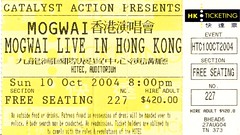不知是不是因為「樹大招風」(或曰「人怕出名豬怕肥」),最近不時聽到人們對龍應台的不滿、非議。
今天在《明報》讀到馬傑偉題為「龍應台」一文,內容是關於他一位台灣朋友對《讀書》七月號一篇批評龍氏的文章感到雀躍,並說:「她的文章寫得好、寫得快,能討好讀者,也有明星效應,但至於觀點、內容,並不經得起考驗。」
我暫不敢說龍氏文章的觀點、內容是否真的不經得起考驗,但最近的確對她越來越有所保留--雖不至於不屑如我對某李氏大教授,但總開始質疑:她說了很多,但實際做了有幾多呢?她對香港的了解其實有多深呢?
上星期我到了書展(呃……其實應是「人展」,因為我見到的盡是人頭,幾不見書……),聽了她的「視野從跨越而來」的講座。因為開始對龍氏有不良的觀感,所以對講座不抱期望。再加上由於場外人頭湧湧,過於熱血沸騰;場內則冷氣呼呼,溫度過低,因而感到有點煩悶,索性學著某位我尊敬的老師坐著閉目養神,決心抵著寒溫,細心聽聽龍氏的演講。
龍氏首先談了「視野如何從跨越而來」(確實內容忘掉了),然後談到香港的身份認同,繼而講及「如果我是香港人」。
「如果我是香港人」這部份,大抵是我記得最清楚的一個部份,也是我最不滿的部分。
她說,如果她是香港人的話,會叫兒子好好認識香港/中國(?)的文化(按:不太記得她怎樣說,但我應該認識香港文化與中國文化是有別的)。如何認識呢?就是孔子、老子、莊子等經典逐字細讀(按:如朋友的補充,總之是中國的高雅文化)。
那我可慘了,我一下子不配成為香港/中國人。我讀過的古文經典,大多是源是中學時代的中國語文科和中國文學科,課餘我頂多看看金庸、衛斯理、亦舒……我家兩老更無望成為香港/中國人了,字又不懂多個,如何看孔子、老子、莊子呢?
那一刻,我想起馬國明先生《路邊政治經濟學》中的「街頭掠影」,然後想起灣仔、小販、魚蛋、砵仔糕……(繼而便飢寒交迫囉 ~~~)我想,要真正認識香港,其中不能不認識這些街頭文化啊。
她又說,如果她是香港人的話,會叫兒子好好學好廣東話,因為廣東話是香港的本土語言,也是比普通話更精彩生動的語言。
那一刻,我感到不以為然,因為我覺得她這說法,過於簡單,也欠缺作為(前)文化局局長、文化教授應有的批判性。
記起我曾經引用龍氏的論點,寫了一篇批評中大重英輕中的語文政策的文章。後來再細想,特別是看到一位老師的文章之後,我便覺得我當時的觀點過於輕率及欠缺批判性。老師的文章,節錄如下:
[T]he dominance of Cantonese in Hong Kong, as much as the dominance of English, is the result of colonialism.British colonialism have led to the negligence of Putunghua education and the raising of several generations of HK Chinese that are poor speakers of Putunghua, thus rendering them unable to communicate with the majority of the Chinese population and their fellow Chinese citizens. The recognition of this historical shame should have obligated us to greatly expand the use Putunghua instead of Cantonese as the medium of instruction in CUHK and all levels of schooling.
At the same time, we should be critically aware of the fact that Cantonese is not even the indigenous language of Hong Kong, and that the dominance of Cantonese is the outcome of a historical process of hegemony and homogenization that is arguably no less violent than British colonialism. Just think of all the new migrants who even today are regarded as less “Hong Kong” and discriminated against by the majority of HK Chinese because they cannot speak accentless Cantonese. The original inhabitants of HK were the Tankas and the Hakkas, who each spoke their own dialect. The majority of the population here are migrants or their offsprings and descendants. Although Cantonese speaking people have constituted the majority of them, there have always been a significant number of migrants from various places in China, whose mother tongues are not Cantonese. In fact, as recently as the 1950s, Hong Kong was a multiethnic society consisting of multiple linguistic communities, such as Shanghaiese, Chiuchauese, Fujianese, Toisanese, Shantungese, Hunanese, Ningpoese, Hakkas, Tankas, and many more. On top of that, there are non-Chinese ethnic groups who have lived in Hong Kong for generations, and whose ancestors came from Britain, Portugal, Russia, Central Asia, India, Southeast Asia, among other places. If the logic of decolonization means a total rejection of what was culturally imposed on us, we should have rediscovered either our Chineseness by fully adopting Putunghua as the official spoken language, or our multicultural roots by giving due regard to the rights and heritages of all linguistic communities. Either way, the hegemony of Cantonese should be questioned and de-legitimized.
(Eliza Lee, An Open Letter to the Students of CUHK)
簡單來說,廣東話不是香港的本土語言--其實香港是移民社會,而來自五湖四海的移民,本是說多種不同的語言。廣東話成為香港的主流語言,其中一個原因是英國殖民統治刻意抑制普通話在香港的使用。同時,廣東話的語言暴力其實不亞於英語,因為它不時也成為歧視和壓迫他者(如新移民)的工具。
我引用老師文章的目的,固然不是要排斥廣東話,而是希望我們應對廣東話如同我們對英語一樣,有相當的批判性。
後來,在答問期間,龍氏說不出深水(土步)的鴨寮街來,我內心立刻有點雞蛋裡挑骨頭地質疑:其實你有沒有去過深水(土步)呢?還是只從港大沙灣徑25號宿舍遠眺香港,然後寫文章、來演講呢?其實,你對香港的認識有多深呢?
這或許是我草率寫下的文章,還請指正。
















